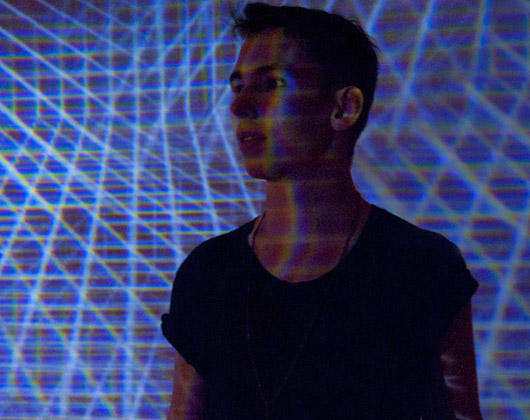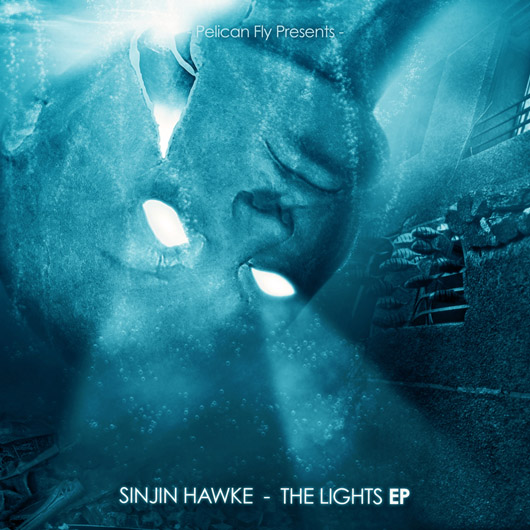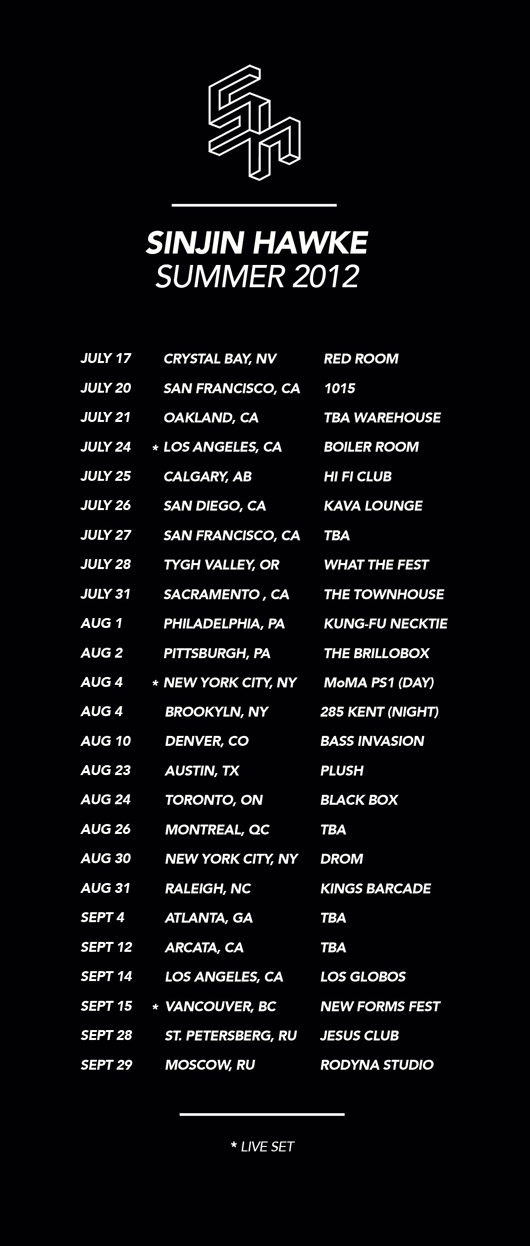Bubblin’ Up: Sinjin Hawke
Although his first official release only dropped last December, the music of Montreal native Sinjin […]

Bubblin’ Up: Sinjin Hawke
Although his first official release only dropped last December, the music of Montreal native Sinjin […]

Although his first official release only dropped last December, the music of Montreal native Sinjin Hawke (who’s currently based in Barcelona) has been floating around underground circles for awhile now, thanks to his time spent as part of the crew behind Montreal’s Boomclap parties, and the impressive run of bootleg reworks and one-off collaborations which preceeded his debut release. In the midst of a North American tour and with a spot secured at this year’s Red Bull Music Academy in New York, Hawke’s sleek and robust take on hybridized forms of bass music have proven worth the buzz.
Hawke says he grew up “surrounded by music,” and with a father who was a classically trained horn player, his earliest days were spent in a house always filled with classical music. But of course, the lure of more modern sounds eventually took hold, as he discovered contemporary R&B and hip-hop through a used CD collection which touted names like Mariah Carey, Nas, Mase, Brandy, and even the gold-tank-riding Southerners of No Limit Records. His experiments with production started in his teenage years. “Around 14 or 15, I realized that I was more drawn to instrumentals then I was to vocals,” says Hawke, “A lot of mediocre rappers were getting famous because they had great producers backing them. Guys like DJ Premier, Just Blaze, 9th Wonder, and Jay Dee—they were all flipping these epic orchestral sections of soul and funk records. I was really naïve and didn’t understand how they were doing it. I didn’t even know they were sampling other artists’ records.” After a few years spent crafting hip-hop instrumentals, Hawke’s interests began to drift towards Montreal’s electronic music scene. “Electronic music is so heavily integrated into Montreal—every major venue is booked to the teeth with artists and even after all the clubs close, people always find a way to keep the night going somewhere else,” he says. “I think my first major epiphany came after seeing DJ Funk and DJ Assault perform on a boat party in the old port. I guess the music clicked because it had a lot of the same elements as rap, but it was more stripped-down, raw, and, at the time, very new to me.”
Hawke created his first palpable waves as a producer with a self-released collection of bootlegged reworks, taking on tracks from Beyonce, The-Dream, DJ Khaled, and other flagship artists of modern hip-hop and R&B and twisting their commercial-radio origins into skittering pieces of underground club music. More than just simply beats flown under well-known acapellas, Bootlegs 2011 transported its subjects into wildly new territory, showcasing Hawke’s adept craftsmanship throughout the entire spectrum of bass-music rhythms, which he combined with an uncommon flair for soul-tinged chords and melodies. The resulting productions were glistening and full, lacing the bouncing beats of juke, grime, garage, and house with lush synths and re-worked R&B hooks. Featuring LOL Boys, Grandtheft, and Marcus Price on tracks throughout the EP, Bootlegs 2011 also hinted at Hawke’s willingness to work with others. His first track to appear on this website was a somehow celestial yet heavy-handed collaboration with Morri$ (who has since been tapped for a single with Night Slugs), and early tunes with the likes of DJ Sliink and Lucid have since made their way around the internet and into the hard drives of bass fiends around the globe.
Much of this collaborative spirit stemmed from Boomclap, a weekly party Hawke was involved with while living in Montreal, working alongside Markus G of the LOL Boys and Azamat B as the night’s residents. Boomclap made a name for itself by bringing more street-influenced club music to the Canadian city. “There was a definite gap in shows being booked in Montreal, and we wanted to fill it. There was practically nowhere to go dance to footwork, grime, and rap, so we set up shop in a small hole in the wall with a semi-decent sound-system,” explains Hawke. “Markus was linked with a lot of budding producers over the internet, so we were able to have artists come in from all over and sleep on my pull-out couch. A lot of them would stay for a few days longer to collaborate on songs and see the city.” For Hawke, Boomclap is “where everything stemmed from” musically, allowing him opportunities such as a chance to collaborate with French wunderkind Canblaster, learn a bit about analog drum machines and synths from fellow local Jacques Greene, and take in sets from pros like DJ Rashad.
Eventually, the Montreal resident picked up and moved to Barcelona (for a girl), setting up shop and crafting his debut EP, The Lights, freshly after his arrival. “The whole moving process was a bit intense, so when I finally got to Barcelona, I think the triumph of the move was reflected in the productions on the EP, and I finished the whole thing in the span of two months right after the move. There were definitely a few themes and reference points that I tried to maintain throughout, but other than that, I was just trying to make a record that I would want to listen to. It was really the first point in my life where I had enough time to make exactly what I wanted to make.”

The debut effort, released towards the tail end of last year through the Belgium-based Pelican Fly label, offered a complete version of what the fractured pieces of collaboration and commercial re-rubs had hinted at, displaying his chops as a bass-music nomad across eight tracks of skittering, slippery, space-age dance music. Essentially, every corner of the more head-nod-worthy factions of forward-thinking club fare gets its moment to shine on The Lights—opener “Shadows” swirls in bright, spacious ambience before morphing into a lurking, half-time slice of almost angelic boom-bap; “Crystal Dust” floats between anthemic grime and hyper-driven post-dubstep; and “Crimson Tides” accounts for the EP’s funkiest effort, employing a bevy of juke-minded drum fills and chops alongside a rich gathering of cascading melodies and even outright horn stabs. The entire EP comes soaked in a perceivable warmth, not so much in the sonic textures (which are for the most part smoothed over with a futuristic touch), but rather in the tunes’ musical aspects—the soul-touched chords, the poignant melodic flurries, and the orchestrated arrangements which combine layers of horns, pianos, and strings along with helpings of glowing synthesizers. Songs like “Love Is On Your Side” even touch on something heartfelt, but still, every cut on The Lights is finely tuned for the dancefloor. It’s an EP that dangerously plays between a wide scope of hybrids, but nothing ever seems out of place, and given its inherent risks, the rewards seem that much more worthwhile.
Looking ahead, Hawke is focused on his live set, which he’ll be trotting all over North America for most of the summer with sets at Boiler Room LA, NYC MoMA’s PS1 Warm Up series, Vancouver’s New Forms Festival, and many other locales (the full list of dates can be found below). Although his productions are mostly computer-based, Hawke says he spent months developing a live set which is more hardware based. “I decided to leave the computer out and limit myself to an MPC and some analog synths, effects, and drum machines,” he explains. “It took me a few months to put the whole thing together—write the songs and program the synths.” Aside from a forthcoming vinyl reissue of The Lights EP, there appear to be no exact release plans in his future, but when asked what’s next for him, Hawke rolls off a list of collaborations in the works with names like Nadus, Morri$, Canblaster, and Riton, as well as plans to work with “a few hyphy artists” when his tour takes him out to California’s Bay Area. Clearly, not unlike his music, Hawke seems to be up to a bit of everything.


